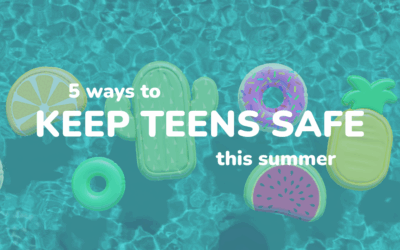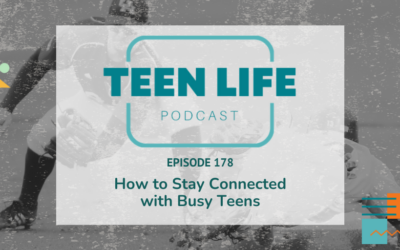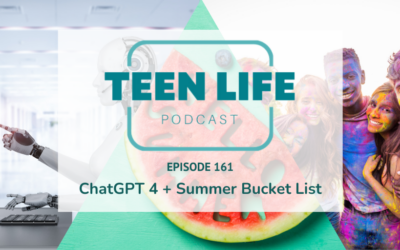The Ultimate Guide to Summer with Teens
Tips and Resources for Parents, Mentors, and Youth Workers
Without the pressure of school schedules, teens are more open to building relationships, exploring passions, and growing emotionally and spiritually. Whether you’re a mentor, parent, student minister, or youth worker, summer is your chance to connect with teens in life-shaping ways.
This guide will help you make the most of the season—with ideas, tools, and encouragement to help teens thrive during summer.

Why Summer Growth Matters for Teens
Without the rigid structure of school, teens experience a shift that opens the door to new possibilities. For some, it’s a chance to rest and recharge. For others, the lack of routine can feel unsettling. For others still, it’s a shift from one chaotic schedule to another. Either way, how teens spend their summer can shape their mental health, identity, relationships, and even their future trajectory.
Here’s why summer matters so much:
1. Emotional Reset and Mental Health Relief
But with that freedom comes a challenge: some teens struggle with boredom, loneliness, or increased anxiety during unstructured time. That’s why a balanced summer—with space to rest and space to grow—is vital.
2. Identity and Independence Development
Who am I? Where do I belong? What do I care about?
During summer, teens are less defined by school roles—the athlete, the overachiever, the outsider—and more free to experiment with interests, beliefs, and values. They can try new things, meet different people, or even just sit with themselves in ways they can’t during the school year.
When trusted adults encourage exploration and ask reflective questions, teens can take huge strides in self-awareness and confidence.
3. A Rare Season for Mentorship and Connection
- Have deeper conversations.
- Try something new together.
- Be consistently present.
Whether it’s through a weekly check-in, a shared project, or simply showing up at a teen’s game or recital, mentors and parents can build trust and belonging in ways that carry through the rest of the year.
4. Future Ready Growth Without the Stress
- Life skills (like budgeting, cooking, or navigating public transit)
- Job shadowing or part-time work
- Community service and leadership
- Spiritual exploration and goal-setting
Teens who engage meaningfully over summer are often more confident, motivated, and socially connected when school resumes.

When we see summer not as “free time to fill” but as sacred space to grow, we become partners in teens’ lifelong development.
Your presence matters more than ever.
For insights on guiding teens through the summer, explore Navigating Your Teen Through the Summer.
These articles and podcast episodes are full of great ideas for activities, games, and conversations to help you connect with teenagers over the summer.
5 Ways to Keep Teens Safe This Summer
Summer is fun, but that doesn’t mean that teens get unlimited freedom. To keep teens safe, we need to be even more on guard and set some of these boundaries!
How to Connect with Busy Teens | Ep. 178
Struggling to connect with busy teens? Discover simple, meaningful ways to stay close—even when life gets hectic. Learn why even small moments matter.
ChatGPT + Summer Bucket List | 161
Get our fun summer bucket list for teens and families to create lasting memories together! Also listen for an update on teen terms and ChatGPT.
125: Screen Apnea & Summer Recap 2023
Discover the hidden health risks of using screens. Breathe easy with our tips for a healthier digital life. Plus, relive the best of summer 2023 trends.
Ep. 109: Stealing & Summer Ideas
Learn more about shoplifting- why teens do it and how you can help them stop. Also listen for tons of ideas on things to do this summer.
Summer Bucket List for Families
Get ideas on how to create a plan that the whole family will love and make this summer the best yet for you and your teen.
Get more resources on summer with teens and practical ways to build stronger, more supportive relationships with the young people you care about.
Supporting Teen Mental Health During Summer
Your role as a caring adult is crucial. By offering consistent presence, understanding, and practical support, you can help teens navigate the emotional terrain of summer with resilience and hope.
Common Mental Health Struggles Teen Face in Summer
Isolation and Loneliness
Friends may travel, family schedules shift, and structured activities pause. Teens without strong social networks can feel left out or forgotten.
How to Help: Organize small gatherings or casual hangouts. Even simple game nights or park meet-ups can help teens feel connected. Encourage them to reach out to friends or join community activities.
Anxiety Over Unstructured Time
While many teens crave freedom, too much unstructured time can be overwhelming. Teens may feel pressure to be productive, stay busy, or live up to “perfect summer” expectations seen on social media.
How to Help: Help them create gentle routines—like setting small daily goals or planning a weekly activity. Discuss the idea that rest and downtime are valuable, too.
Screentime Overload
With more free hours, many teens default to screens—gaming, social media, binge-watching—sometimes as a way to escape feelings of boredom or anxiety.
How to Help
Have a family screen detox. Spend a weekend playing board games or going camping and keep screens to a minimum (texting and calling).
Or rather than banning screens, help them balance it. Suggest time limits, outdoor activities, or tech-free zones during certain hours. Model healthy screen habits yourself.
Don’t miss these resources on managing screentime:
Disrupted Sleep Patterns
Late nights and irregular schedules can throw off sleep rhythms, impacting mood and mental health.
How to Help: Encourage a consistent sleep routine. Discuss the impact of sleep on mental health and offer practical tips like winding down with a book or limiting screens before bed.
Read more about teens and sleep at Ep. 75: Sleep Disorders & Fall Trends, Ep. 111: Laziness, and Ep. 95: Intentional Rest & Discord.
Comparison and FOMO (Fear of Missing Out)
Social media often amplifies feelings of inadequacy during summer—when it looks like “everyone else” is traveling, partying, or living their best life.
How to Help: Talk openly about the difference between real life and social media highlights. Encourage gratitude journaling to shift focus from comparison to appreciation.
You’ll find great tips for managing social media and teens here:

Practical Ways to Support Teen Mental Health
Create Space for Honest Conversations
Ask open-ended questions like:
- “What’s been the best part of your summer so far?”
- “What’s been harder than you expected?”
- “Is there anything you’re worried about this summer?”
Make it clear that no topic is off-limits and that you’re willing to listen without judgment.
Encourage Meaningful Routines
Suggest building a “Summer Rhythm”:
- Morning: Exercise, breakfast, and setting goals for the day.
- Midday: Social time, hobbies, or learning something new.
- Evening: Reflection, journaling, winding down.
These simple routines can anchor their days and reduce anxiety.
Promote Mental Wellness Activities
- Mindfulness Practices: Teach simple breathing exercises, meditation apps, or guided journaling.
- Physical Movement: Walks, yoga, swimming, or biking. Movement is powerful for releasing stress.
- Creative Outlets: Art, music, writing, or building projects can be therapeutic.
- Outdoor Time: Nature walks, picnics, or reading outside can reset their mind.
Be Proactive About Checking In
Don’t wait for them to speak up. Regularly ask how they’re feeling, even if it’s a quick, “How’s your heart today?”
Normalize talking about mental health just like physical health. This makes it easier for them to reach out when they’re struggling.
Check out these resources about checking in:

Helping Teens Set Mental Health Goals
Guide teens in setting simple, achievable goals for their mental well-being:
- Spend 20 minutes outside each day for fresh air and sunlight.
- Limit screen time by setting small boundaries—like no phones at meals or after 10 PM.
- Reach out to one friend each week—even if it’s just a text or a call.
- Practice gratitude journaling—three things they’re thankful for each day.
- Try one new self-care activity—meditation, running, painting, or cooking.
The Most Important Thing You Can Do Is BE THERE.
Text them, invite them for a walk, send a funny meme—showing up in little ways builds trust.
When they open up, listen more than you talk. Sometimes, they just need someone to sit with them in their feelings.

Need a place to start?
Try one of these free downloads:
Summer Connection Ideas (That They’ll Actually Like)
Skip the lecture—lean into experiences and conversations.
Here are low-pressure, high-impact ways to connect with teens this summer:
Creative Experiences
- Host a DIY art night, video challenge, or music jam session.
- Invite teens to co-create a podcast, short film, or social media series.
- Create a “Summer Bucket List Wall” at your youth center or home.
Looking for inspiration? Check out ChatGPT + Summer Bucket List for fun-filled activities that teens and families can enjoy together.
Low-Key Hangouts
- Ice cream meetups, movie nights, game tournaments.
- “Late Night Talks” at fire pits or under the stars.
Pro Tip: Invite teens to help plan events—it gives them ownership!
Growth Opportunities
- Offer life-skill workshops (how to cook, budget, or apply for jobs).
- Launch a summer mentoring circle around emotional wellness or identity.
- Plan a “try something new” day (hiking, photography, improv, etc.).
For more ideas, listen to Ep. 109: Stealing & Summer Ideas which discusses reasons behind certain teen behaviors and offers a plethora of summer activity suggestions.
Make Summer Meaningful with Service and Purpose
Summer is a powerful time to help teens look beyond themselves and find purpose.
Try these ideas:
- Local service projects: food banks, summer camps, neighborhood cleanups.
- Peer mentoring: older teens supporting middle schoolers.
- Faith in action: mission trips, community prayer nights, reflection spaces.
Even a few hours a week can make a teen feel needed and seen.
Your Role This Summer: Show Up, Stay Curious
You don’t have to have all the answers—you just need to show up.
Teens don’t always say it, but they crave connection with caring adults. Your presence is more powerful than any program.
This summer, aim to:
- Be available without pressure.
- Celebrate small wins.
- Ask more questions than you answer.
And when in doubt? Listen. Then listen a little more.
Need something to talk about? Try listening together to this series of short podcast episodes designed to get everyone talking.






